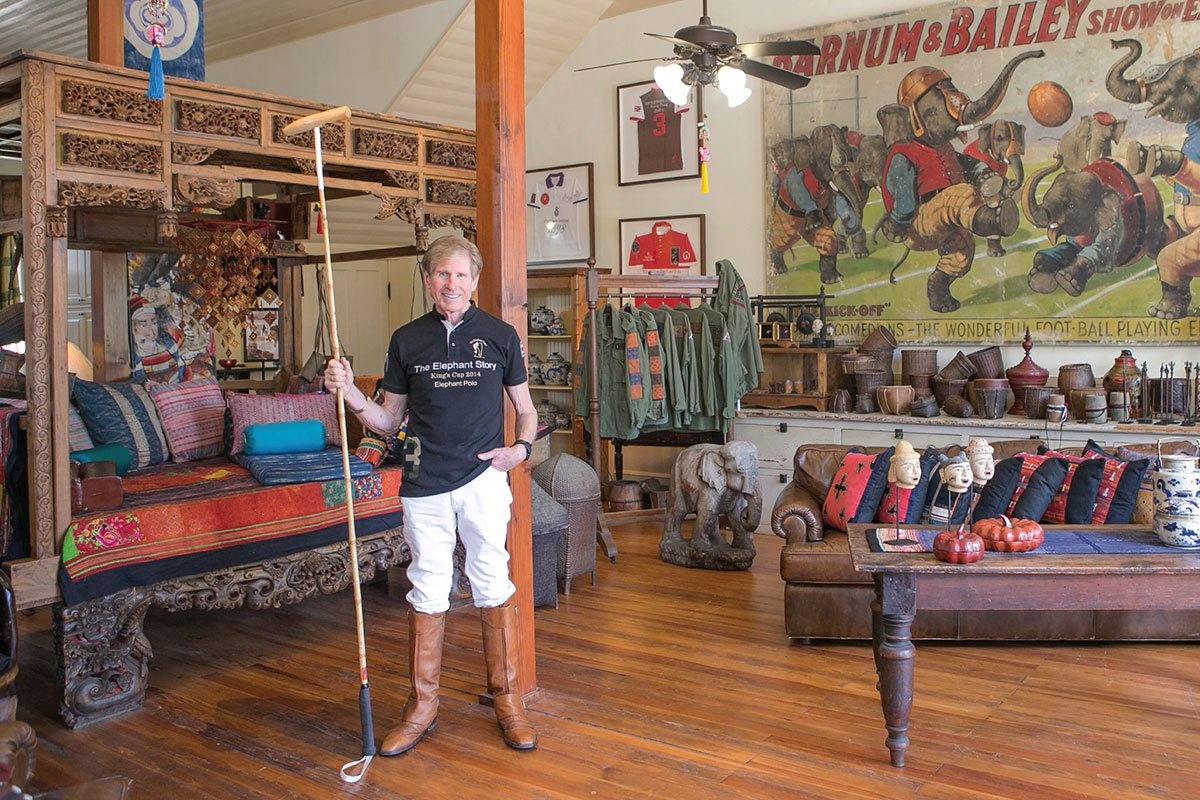Signs on the roads into the bucolic Hill Country town of Comfort tout the village’s antique stores, but there also should be a sign that reads: “Home of the only elephant polo store in the world.”
That store is Elephant Story, and its mission is to serve as “a home for elephant conservation.” The proceeds from the store and the polo games it sponsors benefit endangered Asian elephants and their mahouts—trainers and keepers. The store’s proceeds are specifically destined for Moo Baan Chang, a village in northeast Thailand, where 200 rescued elephants, the mahouts and their families live. Mahouts are separated from their elephants only by death.
Elephants are a symbol of sacred power in Thailand, and wild elephants are threatened by human encroachment. Now, thanks to Ed Story and his store, about $200,000 has been raised, and 200 elephants have been relocated to Moo Baan Chang. Story estimates Thailand is home to 5,000 domesticated elephants.
The nonprofit Elephant Story opened in 2014 and inhabits a limestone building on High Street in the heart of Comfort’s historic district. The improbable brainstorm of Story, a retired oilman who lives on a ranch outside Comfort, the shop offers all things elephant-related: Southeast Asian crafts, fabrics, clothing and jewelry, along with rare Black Ivory Coffee at $50 an ounce.
But why does this elephant aficionado sit astride a 10-foot mammal that weighs 5 tons to play polo in a steaming Southeast Asian jungle clearing?
It’s his idea of fun.
How long does it take to train an elephant to play polo?
“About three days,” Story says.
Story began his career in the oil and gas business in Bangkok. There he learned to speak Thai and ride elephants for fun. It was the beginning of his affection for the world’s largest land mammal.
“They are really smart,” Story says, “and they are the only animals besides humans and apes that feel empathy.”
The Asian elephant in Thailand became “unemployed” after teak logging was banned. Before that, the obedient elephants would haul teak logs down steep mountainsides. After the ban, the elephants and mahouts moved to the cities for work. The mahouts often sold sugar cane to tourists to feed the elephants.
Elephant polo was played in India in the early 20th century and then made its way to Laos, Myanmar and Thailand in the early 1990s. Each elephant carries two riders. Because the mahouts know the individual elephants so well, they also are part of the elephant polo matches. The mahout sits behind the elephant’s head and guides the animal according to commands from the rider who sits astride, holding the polo mallet. There are two seven-minute chukkars, or periods, each followed by a 15-minute break. The entire game lasts about an hour.
The Elephant Story hosted the second annual Elephant Story Invitational Tournament last June in Moo Baan Chang. Story invited six teams for the tourney, and each team contributed $10,000 to the cause.
Story says of his customers, “Do I care if they come? Do I care if they buy?” he asks before answering himself. “Not as much as I care about them getting the concept about promoting sustainability of the animal, elephant.”
Elephants are a symbol of sacred power in Thailand, and wild elephants are threatened by human encroachment. So from a store in tiny Comfort, another kind of power—the power of proactive conservation—reaches all the way to Thailand.
——————–
Mary Lance is a San Antonio writer who has written for newspapers and numerous magazines.


